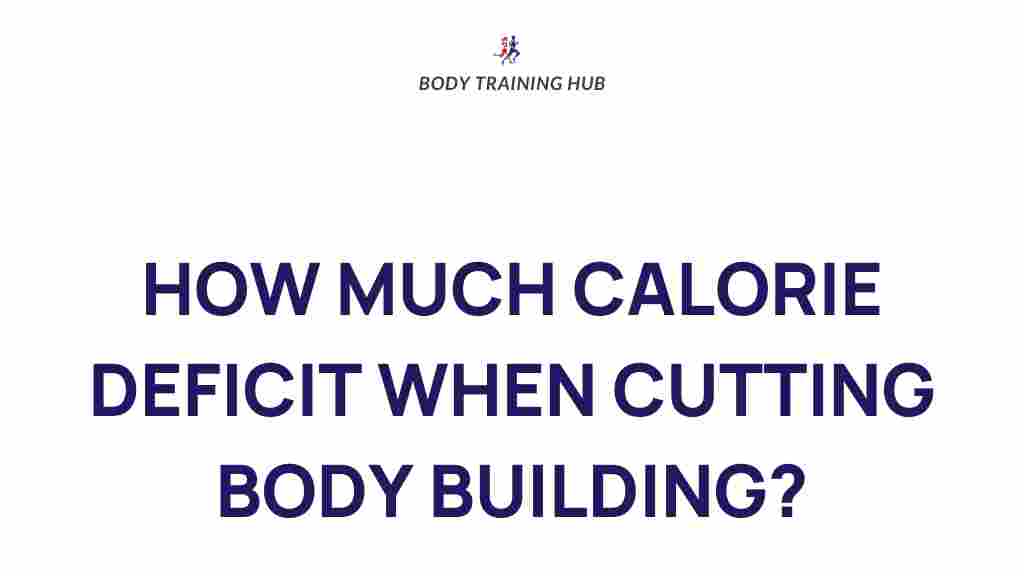Unveiling the Secrets of Calorie Deficit in Bodybuilding
Bodybuilding is a nuanced discipline that requires a deep understanding of nutrition, exercise, and the science of the human body. One of the most critical concepts in achieving your bodybuilding goals is the calorie deficit. Whether you are looking to lose weight, gain muscle, or simply maintain your physique, understanding how a calorie deficit works is essential. In this article, we will explore the relationship between calorie deficit and bodybuilding, providing you with the knowledge you need to optimize your nutrition and training for effective weight loss and muscle building.
What is a Calorie Deficit?
A calorie deficit occurs when you consume fewer calories than your body expends in a day. This creates an energy shortfall that forces your body to use stored fat for energy, leading to weight loss. In the context of bodybuilding, a calorie deficit can be a powerful tool for cutting fat while preserving muscle mass.
The Importance of Nutrition in a Calorie Deficit
Nutrition plays a pivotal role in achieving a successful calorie deficit. To ensure you lose weight effectively while bodybuilding, consider the following:
- Macronutrient Balance: Focus on a balanced intake of proteins, carbohydrates, and fats. Protein is particularly important for muscle preservation.
- Quality of Food: Opt for whole, nutrient-dense foods such as lean meats, vegetables, whole grains, and healthy fats.
- Meal Timing: Consider spreading your meals throughout the day to keep your metabolism active and manage hunger levels.
How to Create a Calorie Deficit for Bodybuilding
Creating a calorie deficit involves several steps. Here’s a detailed guide to help you structure your approach:
Step 1: Calculate Your Basal Metabolic Rate (BMR)
Your BMR is the number of calories your body needs to maintain basic physiological functions at rest. You can use the Mifflin-St Jeor equation to estimate your BMR:
- For men: BMR = 10 × weight (kg) + 6.25 × height (cm) – 5 × age (years) + 5
- For women: BMR = 10 × weight (kg) + 6.25 × height (cm) – 5 × age (years) – 161
Step 2: Determine Your Total Daily Energy Expenditure (TDEE)
To find your TDEE, multiply your BMR by an activity factor based on your lifestyle:
- Sedentary (little or no exercise): BMR × 1.2
- Lightly active (light exercise/sports 1-3 days/week): BMR × 1.375
- Moderately active (moderate exercise/sports 3-5 days/week): BMR × 1.55
- Very active (hard exercise/sports 6-7 days a week): BMR × 1.725
- Super active (very hard exercise/sports & a physical job): BMR × 1.9
Step 3: Set Your Calorie Deficit
To lose weight, you typically need to create a calorie deficit of 500 to 1000 calories per day, which can lead to a safe weight loss of about 1 to 2 pounds per week. However, in bodybuilding, a more moderate deficit of around 250 to 500 calories may be preferable to help preserve muscle mass.
Step 4: Monitor Your Progress
Tracking your food intake and body measurements is crucial. Use a food diary or an app to help you stay accountable. Adjust your calorie intake based on your progress, as weight loss may slow down over time.
Step 5: Adjust Your Training Program
When in a calorie deficit, your training may need to adapt. Here are some tips to optimize your workouts:
- Focus on Strength Training: Prioritize lifting heavy weights to maintain muscle mass.
- Incorporate Cardio Wisely: Include moderate cardio sessions to support fat loss without compromising strength.
- Listen to Your Body: Ensure adequate recovery and consider deload weeks if you feel fatigued.
Troubleshooting Common Issues in a Calorie Deficit
While a calorie deficit is essential for weight loss, it can come with challenges. Here are some common issues and how to address them:
Plateaus
If you hit a weight loss plateau, consider the following:
- Reassess your calorie intake and activity level.
- Change up your workout routine to challenge your body differently.
- Consider a brief increase in calories to reset your metabolism.
Lack of Energy
Feeling fatigued is common in a calorie deficit. To combat this:
- Ensure you’re getting enough sleep each night.
- Focus on nutrient-dense foods that provide sustained energy.
- Stay hydrated to support overall bodily functions.
Muscle Loss
To preserve muscle while losing weight:
- Prioritize protein intake (aim for 1.6 to 2.2 grams of protein per kilogram of body weight).
- Engage in resistance training consistently.
- Avoid extreme calorie deficits.
Conclusion: Mastering the Calorie Deficit for Bodybuilding Success
Understanding the concept of calorie deficit is crucial for anyone serious about bodybuilding and weight loss. By carefully calculating your BMR and TDEE, setting a manageable calorie deficit, and focusing on nutrition and training, you can effectively lose fat while preserving muscle. Remember, patience and consistency are key. As you continue your journey, always be open to adjusting your approach based on your progress and how your body responds.
For more resources on nutrition and bodybuilding, check out this comprehensive guide. And if you need further assistance in your fitness journey, consider consulting with a certified personal trainer or nutritionist.
By following these guidelines, you’ll be well on your way to achieving your bodybuilding goals and mastering the art of a calorie deficit.
This article is in the category Nutrition Fundamentals and created by BodyTraining Team
